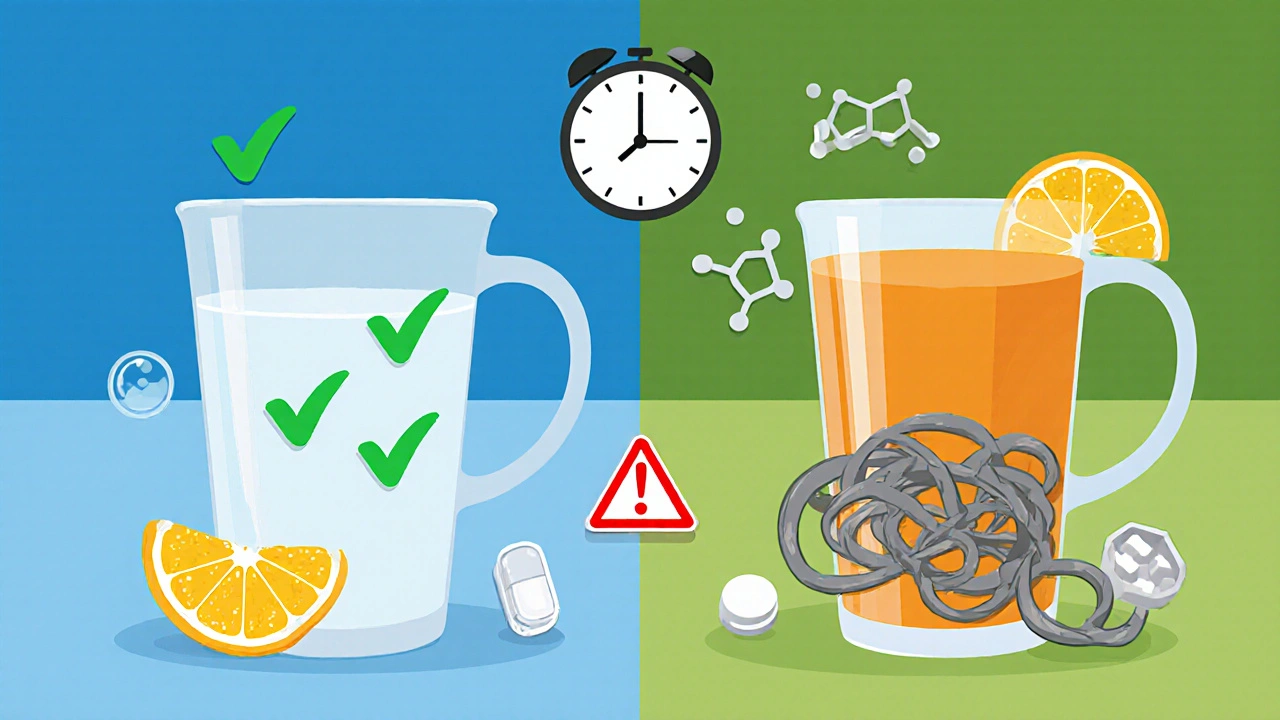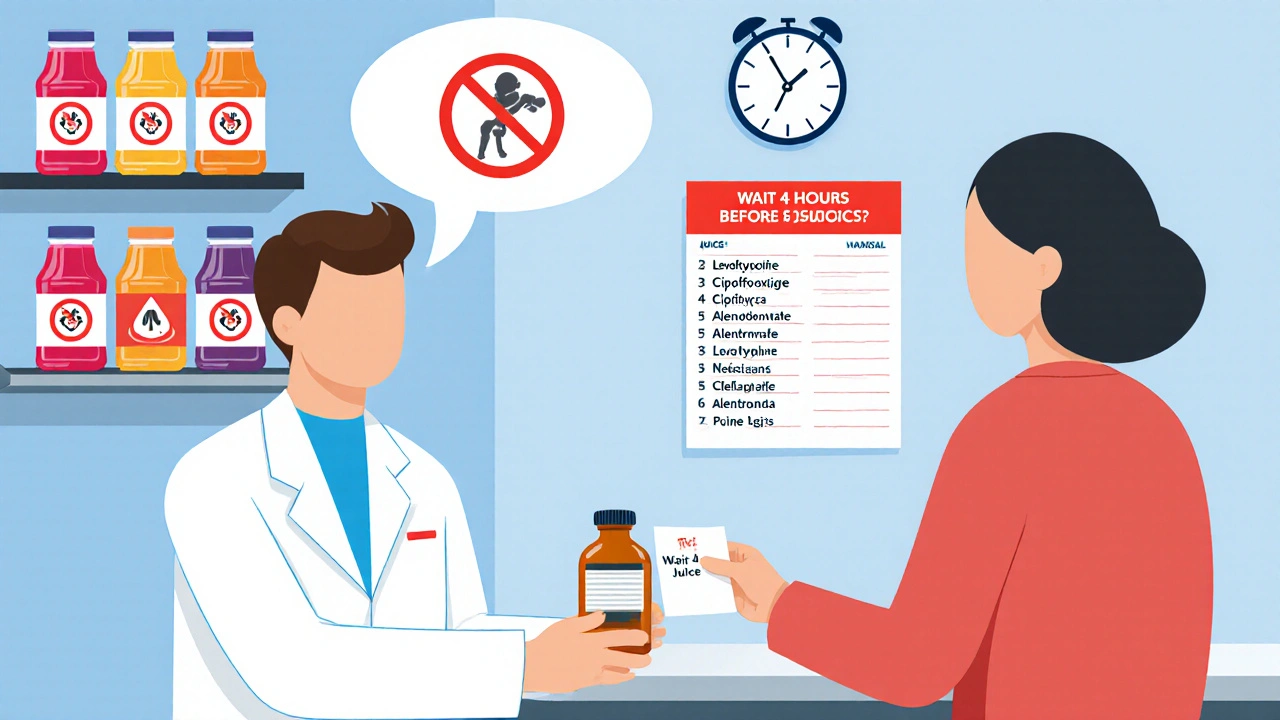Calcium-Fortified Juices and Medications: What You Need to Know About Binding and Absorption Issues
 Nov, 24 2025
Nov, 24 2025
Calcium Medication Timing Calculator
Medication Safety Calculator
Calculate the safe waiting time between your medication and calcium-fortified juices to prevent absorption interference.
Recommended Waiting Time
Based on your selection:
Why this matters: Calcium in fortified juices can bind to medications, reducing absorption by up to 80%.
Important: This calculator shows minimum waiting times. For best results, take medications with plain water only.
Medications most affected:
- Tetracycline antibiotics
- Fluoroquinolone antibiotics
- Bisphosphonates
- Levothyroxine
- Ketoconazole
Drinking a glass of calcium-fortified orange juice with your morning pill might seem like a smart health move-especially if you're trying to boost your bone health or avoid dairy. But here’s the harsh truth: that glass could be sabotaging your medication before it even starts working.
Why Calcium-Fortified Juices Interfere With Medications
Calcium-fortified juices aren’t just regular fruit juice with a vitamin label. They’re loaded with calcium carbonate or calcium citrate-often 300 to 350 mg per 8-ounce serving. That’s about the same amount of calcium as a cup of milk. Sounds good, right? Until you take it with certain drugs. The problem isn’t the juice itself. It’s the calcium ions. When calcium meets certain medications in your stomach or intestines, it forms tight molecular bonds-called chelates-that lock the drug into a shape your body can’t absorb. Think of it like glue sticking to a key. The key (your medicine) still exists, but it can’t fit into the lock (your body’s absorption system). This isn’t theoretical. Studies show calcium can reduce drug absorption by up to 80%. The calcium and medications interaction is so well-documented that the U.S. Pharmacopeia classifies it as a Class 1, major food-drug interaction. And yet, most people have no idea it’s happening.Medications That Can’t Handle Calcium
Not every drug is affected. But the ones that are? They’re critical. Here’s the short list of medications that can fail if taken with calcium-fortified juice:- Tetracycline antibiotics (like doxycycline and minocycline): Used for acne, Lyme disease, and respiratory infections. Calcium binds to them so tightly, they become almost useless.
- Fluoroquinolone antibiotics (like ciprofloxacin): Commonly prescribed for urinary tract infections. One study found that taking ciprofloxacin with calcium-fortified orange juice led to treatment failure in 25-30% of cases-nearly triple the failure rate compared to taking it with water.
- Bisphosphonates (like alendronate/Fosamax): These are bone-strengthening drugs for osteoporosis. Calcium blocks their absorption entirely, making them ineffective. That means you’re paying for a pill that does nothing.
- Levothyroxine (Synthroid, Levoxyl): The go-to treatment for hypothyroidism. Calcium-fortified juice can slash absorption by 35-55%. Patients often end up with sky-high TSH levels, fatigue, weight gain, and depression-all because they didn’t know juice could interfere.
- Ketoconazole: An antifungal used for stubborn skin and yeast infections. Calcium reduces its effectiveness, increasing the risk of recurring infections.
How Long Should You Wait?
You can’t just take your pill and juice at the same time and hope for the best. Timing matters. And the rules aren’t the same for every drug.- Tetracyclines: Wait at least 2-3 hours before or after drinking calcium-fortified juice.
- Bisphosphonates: Wait 30 minutes to 2 hours. Some guidelines say take these on an empty stomach with plain water only-no juice, no coffee, no food.
- Levothyroxine: This one’s the strictest. You need a full 4-hour gap. Many patients take it in the morning and drink juice with breakfast. That’s a recipe for thyroid levels that never stabilize.

Why Orange Juice Is Worse Than Plain Calcium Water
Here’s something most people don’t realize: calcium-fortified orange juice is double trouble. It’s not just calcium-it’s also citric acid. That acid changes the pH in your stomach, which messes with how some drugs dissolve. A 2021 study compared calcium-fortified orange juice to calcium-fortified water. The orange juice reduced ciprofloxacin absorption by 42%. The plain calcium water? Only 31%. That 11% difference isn’t small. It’s the difference between your infection clearing up and coming back worse. And it’s not just orange juice. Any citrus-based fortified juice-apple, grapefruit, pineapple-has similar risks. The citric acid isn’t the villain by itself. But paired with calcium? It’s a one-two punch.What Patients Are Saying
Real people are getting hurt. On Reddit, a user wrote: “I took cipro with my calcium OJ every morning for a week. My UTI got worse. My doctor said I didn’t take it right. I thought I was doing everything right.” On Drugs.com, a 45-year-old woman shared: “My doctor never mentioned calcium OJ would interfere with my Synthroid. I drank two glasses daily with my morning pill for six months. My TSH was sky-high. I felt awful. No one told me.” These aren’t rare stories. The Institute for Safe Medication Practices logged 147 reported cases of therapeutic failure tied to calcium-fortified beverages between 2022 and 2023-a 37% jump from the prior two years.Labeling Is Broken
You’d think the bottle would warn you. But here’s the shocker: 92% of calcium-fortified juice products in the U.S. have no warning about medication interactions on their labels. The front says “High Calcium!” The back says “Great for bones!” Nothing about antibiotics, thyroid meds, or bone drugs. The FDA’s own 2023 draft guidance admits this is a problem. They’re calling for better labeling. But until then, you’re on your own.
What You Should Do
If you’re on any of the medications listed above, here’s your action plan:- Check your meds. Look up your prescription online or ask your pharmacist: “Does this interact with calcium?”
- Read your juice bottle. If it says “fortified with calcium,” assume it’s dangerous with your meds.
- Separate them. Take your medication with plain water. Wait the full recommended time before drinking fortified juice.
- Ask your pharmacist. Don’t assume your doctor told you everything. Pharmacists are trained to catch these interactions. Ask them to review your meds and diet.
- Switch your morning drink. Try plain water, herbal tea, or unfortified juice. You don’t need calcium in your OJ to stay healthy-your diet can provide it.
katia dagenais
November 25, 2025 AT 19:28So let me get this straight-I’ve been drinking my calcium OJ with my Synthroid for three years and now you’re telling me my thyroid is basically a ghost town because of orange juice? I feel like my body has been betrayed by a fruit beverage. I’m not even mad, just… emotionally drained. Why didn’t anyone tell me? Why does health advice always come too late like a breakup text at 3 AM?
Josh Gonzales
November 26, 2025 AT 14:38Been a pharmacist for 18 years and I still can’t believe how many people don’t know this. I had a guy come in last week asking why his doxycycline wasn’t working-he was chugging fortified apple juice with it like it was a protein shake. I showed him the study data and he just stared at me like I spoke Klingon. People trust labels too much. The word 'fortified' sounds like a badge of honor when it’s actually a warning sign in disguise.
Jack Riley
November 27, 2025 AT 09:39Here’s the real question nobody’s asking: why are we even putting calcium in juice in the first place? It’s not a milk substitute. It’s not a supplement delivery system. It’s a fruit drink that got hijacked by corporate wellness marketing. We’ve turned breakfast into a pharmaceutical obstacle course. And now we’re blaming patients for not reading the fine print on a bottle that screams 'HEALTHY!' in neon letters while hiding the danger in 6-point font? This isn’t negligence. This is capitalism with a smiley face.
And don’t even get me started on the fact that calcium citrate is less binding than carbonate-but no one tells you which one’s in your juice. Because transparency is for suckers. The real villain here isn’t the calcium. It’s the system that profits from your ignorance.
I once saw a man take his alendronate with a glass of fortified grapefruit juice and then blame the drug for his broken hip. The drug didn’t fail him. The culture failed him. And now we’re all paying for it-in pain, in pills, in panic.
Jacqueline Aslet
November 29, 2025 AT 01:59It is, without a doubt, a matter of profound concern that the dissemination of pharmacological knowledge remains so ineffectively managed within the public health sphere. The conflation of nutritional fortification with therapeutic safety constitutes, in my estimation, a systemic failure of risk communication. One cannot reasonably expect the layperson to possess the biochemical acumen required to discern molecular chelation dynamics from a beverage label that employs emotive marketing language. The onus, therefore, must be placed upon regulatory bodies and manufacturers to implement unambiguous, standardized, and universally legible warnings. To do otherwise is not merely irresponsible-it is ethically indefensible.
Caroline Marchetta
November 30, 2025 AT 12:12Oh wow. So my 'healthy morning routine'-OJ, Synthroid, and a yoga pose-is actually a slow-motion suicide pact with my thyroid? Thanks for the emotional whiplash. I guess I’ll just stop taking my meds and start drinking plain water… and also cry into my unsweetened almond milk now that I’ve lost my entire identity as a 'health-conscious person.'
Also, why is the FDA still asleep at the wheel? Is this a conspiracy? Is Big Juice paying off regulators? I need a therapist and a new breakfast.
Valérie Siébert
December 1, 2025 AT 06:02OMG I JUST REALIZED I’VE BEEN DOING THIS WRONG FOR YEARS 😭 I take my cipro with my calcium OJ and now my UTI keeps coming back like a bad ex. I thought I was being so healthy!! I’m switching to water rn and also yelling at my doctor tomorrow. Why didn’t anyone tell me?? This is the most important thing I’ve learned since I found out pineapple doesn’t belong on pizza.
Andrew McAfee
December 2, 2025 AT 05:50Man I had no idea this was a thing. I’m from Texas and we drink OJ with everything-breakfast, lunch, after the game. I’ve been on doxycycline twice and never thought twice about it. Guess I got lucky. But this is wild. We need a public service campaign. Like ‘Don’t Juice Your Meds’ or something. Maybe a meme. A cartoon of a pill crying next to a glass of OJ. That’d go viral.
Erika Hunt
December 2, 2025 AT 18:00I really appreciate how thorough this post is-it’s the kind of information that should be mandatory in every pharmacy and doctor’s office. But I also think we need to be gentle with people who didn’t know. I mean, I used to take my levothyroxine with my fortified smoothie because the label said ‘excellent source of calcium’ and I assumed that meant ‘safe for everyone.’ I didn’t know calcium could interfere with absorption until I read this. And honestly? I’m not mad-I’m just grateful someone finally explained it in a way that made sense. Maybe the real solution isn’t just warnings on bottles, but better education in schools, in community centers, in social media campaigns that don’t feel like a lecture. We all deserve to be informed without feeling stupid.